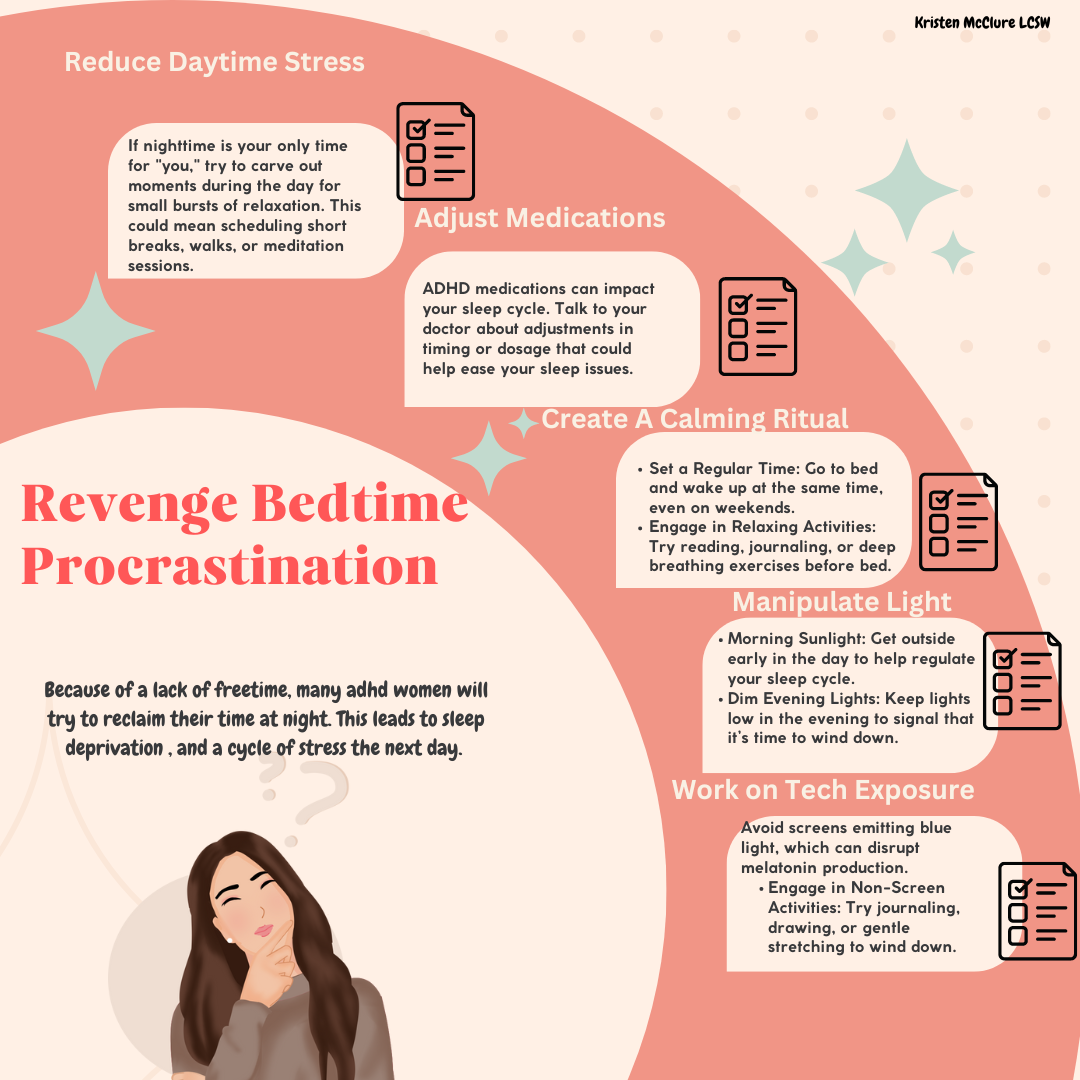
Adhd and Postpartum Depression
 Understanding the Connection Between Postpartum Depression and ADHD
Understanding the Connection Between Postpartum Depression and ADHD 
Navigating the postpartum period is a challenging time for any new mother, but for those living with Attention Deficit Hyperactivity Disorder (ADHD), it can be particularly overwhelming. If you're an expecting or new mother with ADHD, understanding the relationship between ADHD and postpartum depression (PPD) is crucial. This knowledge can help you recognize the symptoms early, seek appropriate support, and manage your mental health effectively.
 TLDR/ FAQs
TLDR/ FAQs
What is the connection between ADHD and postpartum depression?
Women with ADHD are at a 5x higher risk of experiencing postpartum depression and at a 5x higher risk of postpartum anxiety.
What are the key symptoms of postpartum depression in women with ADHD?
Symptoms include profound sadness, anxiety, difficulty bonding with and parenting your baby, feelings of worthlessness, difficulty concentrating, irritability, and physical symptoms like changes in appetite and sleep patterns.
How can I manage ADHD and postpartum depression?
Strategies include planning for extra support, self advocacy, collaborating with knowledgeable healthcare providers, therapy and possibly medication, preparing your partner or support system, and practicing self-compassion and self-care.
What resources are available for women with ADHD and postpartum depression?
Professional help, therapy, support groups, and community resources tailored to new mothers can provide emotional support, practical advice, and a sense of solidarity.
How important is open communication during the postpartum period?
Open communication helps in sharing thoughts and feelings, providing relief, and helping others understand how best to support you. It's crucial for early detection and management of symptoms because the medical community does a poor job of supporting adhd mothers.
ADHD and Postpartum Depression: The Overlapping Challenges
Postpartum depression (PPD) is a mental health condition that affects many new mothers, marked by feelings of deep sadness, anxiety, and fatigue that can interfere with a mother's ability to care for herself and her baby. When you combine ADHD with PPD, the challenges become more complex. ADHD women are at a higher risk for postpartum depression, particularly if they've had previous episodes of depression or anxiety.
The hormonal changes that occur after childbirth can significantly impact your mood and exacerbate ADHD symptoms. Estrogen levels, for example, drop sharply after delivery, which can affect dopamine levels in the brain—a neurotransmitter that plays a key role in ADHD. Understanding this connection is essential for early intervention and effective management.
 The Link Between ADHD and Postpartum Depression
The Link Between ADHD and Postpartum Depression
Research suggests that women with ADHD are more likely to experience postpartum depression compared to those without ADHD. Hormonal fluctuations after childbirth can exacerbate ADHD symptoms, leading to an increased risk of developing PPD. Women with a history of depression or anxiety are particularly vulnerable.
Changes in estrogen and dopamine levels after childbirth can directly impact mood and exacerbate ADHD symptoms. Recognizing ADHD as a risk factor for PPD allows for better awareness and timely intervention, which can help improve outcomes for new mothers.
 Key Statistics and Research on ADHD and Postpartum Depression
Key Statistics and Research on ADHD and Postpartum Depression
Rates of Postpartum Depression and Anxiety in Women with ADHD
Women with ADHD are much more likely to have depression and anxiety after giving birth than women without ADHD.
- Higher Rates of Depression: A study using data from Sweden found that about 16.76% of women with ADHD were diagnosed with depression after giving birth, compared to only 3.29% of women without ADHD. This means that women with ADHD are over five times more likely to have depression after childbirth.
- Higher Rates of Anxiety: The same study also showed that around 24.92% of women with ADHD were diagnosed with anxiety disorders after childbirth, compared to 4.61% of women without ADHD. This indicates that women with ADHD are more than five times more likely to experience anxiety after having a baby.
- Independent Risk Factor: These differences remained significant even after considering other factors that might increase the risk of depression and anxiety after childbirth, such as age, education, living situation, previous history of depression or anxiety, family history, and other mental health issues. This means ADHD itself is an independent risk factor for mental health problems after childbirth.
- Planning and support before and after childbirth to help women with ADHD manage these risks better.
The research also indicates that healthcare providers should consider ADHD as a risk factor when assessing postpartum mental health. Unfortunately this rarely comes up and many women are not recongized as having adhd until their children are diagnosed.
 Risk Factors for Postpartum Depression in Women with ADHD
Risk Factors for Postpartum Depression in Women with ADHD
Several factors can increase the likelihood of developing PPD, particularly if you have ADHD:
Biological Factors
- Hormonal Shifts: After childbirth, rapid changes in hormone levels can affect your mood and amplify ADHD symptoms.
- History of Mental Health Issues: If you've previously experienced depression, anxiety, or other mental health conditions, your risk for PPD increases.
- Birth Complications: Complications during delivery or health problems with your baby can elevate stress and anxiety.
- Substance Use: Alcohol or drug use during or after pregnancy can increase the risk of developing PPD.
Psychological Factors
- Mood During Pregnancy: Experiencing anxiety or depression while pregnant is a strong predictor of PPD.
- High Stress Levels: Personal, work, or financial stress can contribute to the onset of PPD.
- Negative Thoughts: Doubts about your ability to parent or negative feelings about the pregnancy can increase your risk.
Social Factors
- Lack of Support: A weak support system from your partner, family, or friends can lead to feelings of isolation and elevate the risk of PPD.
- Relationship Issues: Tension or dissatisfaction in your relationship can contribute to emotional distress.
- Significant Life Changes: Major events like moving or job loss can trigger PPD.
Socioeconomic Challenges: Limited access to healthcare, low income, or inadequate living conditions can also be risk factors.
 Symptoms of Postpartum Depression in Women with ADHD
Symptoms of Postpartum Depression in Women with ADHD
AS an ADHD women you may experience PPD symptoms that impact both your ability to be emotionally regulated and to think clearly and function.
Let's take a look at those here.
Emotional and Cognitive Symptoms
Emotions you might feel during post partum depression include:
- Profound Sadness or Hopelessness: Persistent feelings of sadness that daily functioning difficult.
- Anxiety and Panic Attacks: Increased anxiety levels and panic attacks are common in women when they are having an episode of ppd.
- Difficulty Bonding with Your Baby: Struggling to form a connection with your baby is often reported in women during ppd episodes.
- Feelings of Worthlessness: Intense guilt or feelings of worthlessness often resulting from the ppd can exacerbate depressive symptoms even more.
- Difficulty Concentrating: During an episode of PPD adhd women report their issues with concentration thinking and focus get worse.
- Irritability and Anger: Increased irritability and anger can cause even more stress for new moms but is a common sign.
- Feeling Overwhelmed: Daily tasks can feel insurmountable, adding to your emotional burden.
Physical and Behavioral Symptoms
Behaviors and physical symptoms you might notice include:
- Changes in Appetite or Sleep Patterns: Eating or Sleeping less or more might be something you notice
- Increased Exhaustion: Although it's hard to tell because all new mothers exprience alot of fatigue, feeling exhausted is a sign of ppd. This type of tiredness can affect your ability to care for yourself and your baby.
- Withdrawal from Social Activities: Feeling a lack of desire to connect with others is a sign of ppd and it can worsen feelings of isolation.
- Lack of Interest in Previously Enjoyed Activities: Losing interest in things you used to enjoyis a common sign of depression.
- Thoughts of Harming Yourself or Your Baby: If you have intrusive thoughts of wanting to self-harm or harming your baby, seek professional help immediately.
 Strategies for Managing Postpartum Depression as an ADHD Woman
Strategies for Managing Postpartum Depression as an ADHD Woman

It's really best to be aware and plan ahead! Research does suggest that a mother’s happiness and overall wellbeing are important predictors of both her own health and her child’s health. A mother's mental and emotional state can significantly impact her child's development, both during pregnancy and after birth.
You can learn a bit about adhd and pregnancy here.
Here are some more ideas based on what I tell my clients.
Plan for Extra Support
Being aware of your increased risk means you should build a strong support system AHEAD of time.
This means educate everyone about the risk. Advocate for yourself and be prepared by planning to have lots of support in place.
Arrange for additional help from family, friends, or professional services to provide emotional support and practical assistance with the baby.
Work with a Knowledgeable Doctor
Make sure your healthcare provider understands the unique challenges of managing ADHD and postpartum depression. If you have a history of mental health issues, this conversation is even more crucial. Your doctor can monitor your mental health and adjust treatment plans as necessary to minimize risks.
 Manage ADHD with Therapy and Medication
Manage ADHD with Therapy and Medication
Keeping your ADHD well-managed is vital. If possible, continue therapy with a specialist who understands the nuances of ADHD and postpartum challenges. Medication may also be an option to consider in consultation with your doctor.
Prepare Your Support System
Educate your partner and support network about how ADHD and postpartum changes may affect you. Understanding these impacts can help them provide the right support during this time.
Practice Self-Compassion and Self-Care
Be kind to yourself. Understand that it's okay not to be perfect and that asking for help is a strength. Incorporate small self-care practices into your routine to nurture your well-being.
 Advocate for Yourself
Advocate for Yourself
Don't hesitate to communicate your needs. Recognize when you're feeling overwhelmed and seek support early to prevent burnout.
Make Life Easier with Self-Accommodation
Set up systems and routines that work for you. Simplify tasks where possible, and don't stress about keeping everything perfect. Focus on what really matters—bonding with your baby and taking care of yourself.
 Conclusion
Conclusion
Navigating the postpartum period with ADHD can be challenging, but with the right support, preparation, and self-awareness, you can manage these difficulties and embrace the joys of motherhood. Remember, you are not alone, and it's okay to ask for help. By being proactive about your mental health and well being, advocating and in some cases educating specialists and communicating openly with your support system, you can thrive during this special time.
 References
References
Baker AS, Wales R, Noe O, Gaccione P, Freeman MP, Cohen LS. The Course of ADHD during Pregnancy. Journal of Attention Disorders. 2022 Jan;26(2):143-148.
Andersson A, Garcia-Argibay M, Viktorin A, et al. Depression and anxiety disorders during the postpartum period in women diagnosed with ADHD. Journal of Affective Disorders. 2023 Jan 18.
References
Baker AS, Wales R, Noe O, Gaccione P, Freeman MP, Cohen LS. The Course of ADHD during Pregnancy. J Atten Disord. 2022 Jan;26(2):143-148.
Andersson A, Garcia-Argibay M, Viktorin A, Ghirardi L, Butwicka A, Skoglund C, Madsen KB, D’onofrio BM, Lichtenstein P, Tuvblad C, Larsson H. Depression and anxiety disorders during the postpartum period in women diagnosed with attention deficit hyperactivity disorder. J Affect Disord. 2023 Jan 18: S0165-0327(23)00085-X.




